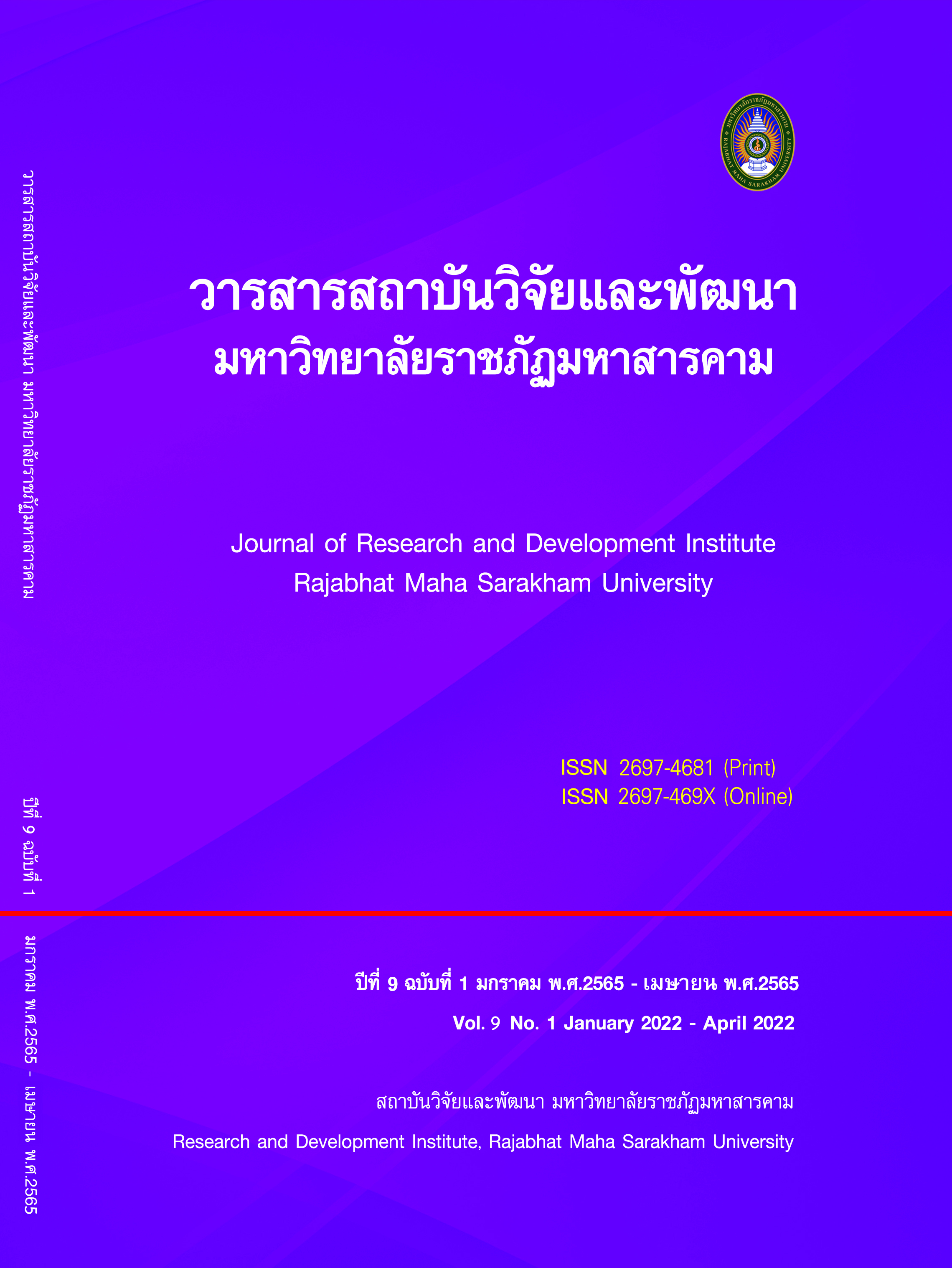Development of learning activities by organizing learning in cippa style buddhism secondary school year 1
Keywords:
Cippa, learning management, Buddhist achievementAbstract
The purpose of this research is to 1) develop a learning activity of Sippa. Buddhism Secondary 1 To be effective according to Criteria 75/75 2) Study the Index of Effectiveness of CIPPA learning activities. Buddhism High School Year 1 3) Compare student achievement before and after class with Cippa learning activities. Buddhism High School Year 1 4) Study student satisfaction with the Sippa learning activities. Buddhism Mathayom Suksa 1, a sample group was Mathayom Suksa 1 student at Kham Pomphitthayakhom School Wapi Pathum District Mahasarakham Province 4) Study of students' satisfaction towards learning activities like Sippa. Buddhism Mathayom Suksa 1, a sample group was Mathayom Suksa 1 student at Kham Pomphitthayakhom School. Wapi Pathum District Mahasarakham Province A total of 30 people were obtained by random order. Research tools include learning management plans. Achievement test And satisfaction questionnaire The statistics used for data analysis were mean, percentage, standard deviation. And statistics test Wilcoxon Singed Rank Test The results of the research were as follows: 1) the results of the development of learning activities in Sippa Buddhism For Secondary Education Level 1 to be effective in accordance with the 75/75 criteria, there were 14 learning management plans. Each plan consisted of essential, standard, indicators Learning purpose Learning The process of organizing learning activities Learn materials / learning resources Measuring and evaluating learning outcomes Notes after learning activities Suitability assessment results The mean values ranged from 4.70-4.80, which was at the most appropriate level and the results were 87.66 / 87.85, which met the specified criteria. Learn Zippa style. Buddhism subjects equal to 0.48, indicating that after studying with Cippa learning activities Buddhism That the researcher has developed Then the students have progressed in their studies Buddhism has increased. 48.00% 3) Academic achievement of Mathayomsuksa 1 students by organizing Sippa learning activities. Buddhism The study was significantly higher than before studying at the .05 level. 4) Student satisfaction with the Zippa learning activities. Buddhism Secondary school year 1 overall was at the highest level.
References
Buarikan, C. (2016). Learning management using cippa Model on permutation for mathayomsuksa 5 students. Chonburi: Burapha University.
Chaichanalert, T. (2015). Organization of CIPPA Model Learning Activities (CIPPA) using newspapers to develop critical thinking skills. Educational achievement and practice according to the five principles of religion, morality, ethics (Buddhism) of Prathomsuksa 6 students. Graduate School Journal Chiang Rai Rajabhat University Volume 8 Number 18 September - December 2015.
Detchaisri, A. (2000). Handbook of school development towards educational standards: teaching that emphasizes student center (2nd ed). Bangkok: Educational Quality Assurance Program Department of Academic Affairs, Ministry of Education.
Kham Pom Pittayakhom School. (2019). Form for recording results of student quality development in the course Kham Pom Pittayakom School Academic year 2019. Maha Sarakham: Khampom Pittayakhom School.
Khammani, T. (2000). Pedagogical Science : Knowledge for effective learning process management. (4th ed). Bangkok: CU PRESS.
Ministry of Education. (2008). Basic Education Core Curriculum 2008. Bangkok: Cooperative Printing House Agriculture of Thailand.
Phonyiam, T. (2017). Comparison of learning achievement Problem solving and attitude towards social studies of mathayom suksa 2 students studying with ZIPA learning management and problem-based learning management. Maha Sarakam: Maha Sarakam University.
Phra Dhammapitaka (P.A. Payutto). (2000). The Importance of Buddhism as a National Religion. (10 th ed). Bangkok: Saha Thammamic Co., Ltd.
Thongphan, N. (2014). Comparison of learning achievement, analytical thinking ability, and attitude towards Buddhism in Mattayom Suksa 1 between Yonisomanasikara learning activities and Zippa learning activities. Maha Sarakham: Maha Sarakham University.
Wittawat, W. (2004). Textbook of basic learning subjects for social studies and religion learning groups and culture, Buddhism, M.1, 3rd floor. Bangkok: Aksorn Charoenthat.
Downloads
Published
How to Cite
Issue
Section
License
Copyright (c) 2022 Journal of Research and Development Institute Rajabhat Maha Sarakham University

This work is licensed under a Creative Commons Attribution-NonCommercial-NoDerivatives 4.0 International License.
Articles that are published are copyrighted by the authors of the articles







